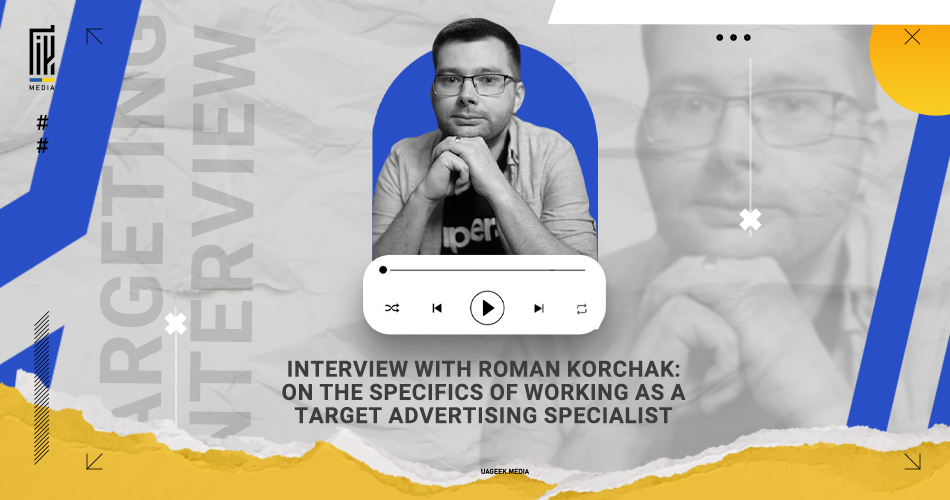Welcome, dear community! We’ve already told you ABOUT THE DIFFERENCE BETWEEN A TARGETOLOGIST AND AN AFFILIATE MARKETER? Today, we’ll talk with Roman Korchak – owner of the Telegram channel “Real Target” and author of the RE:boot mentorship course for targetologists.
Find out how a person with an anesthesiologist’s education managed to get into targeting, what his first project was, what skills are a must-have for a beginner targetologist, and what astrology has to do with it – all in our fresh interview!
How did life lead you to targeting? Tell us how you started.
I started a long time ago, back in 2013-2014 as a copywriter while I was still studying in med school, but as you see, it didn’t quite work out. In 2016, I smoothly transitioned into SMM, and in 2018, thanks to a friend, I started learning about targeting. By that time, I already had several requests for ad setup and I began successfully.
Tell us about a targetologist’s action plan. How does it all happen?
It’s quite simple, just like in all marketing: market analysis, creative references, studying the product and target audience, launch, performance analysis, scaling, retargeting.
Do you remember your first project? What was the vertical, what budget did you work with, and did you immediately profit?
Yes, I vividly remember, it was a psychologist-astrologer and she was quirky because she wanted to launch ads between 6:27-6:47 AM, as the stars suggested. Regarding the profit, I can’t say, she had a terrible website and I set up a quiz without her approval. When she received 300 leads, she freaked out. So the story ends there.
What were the greatest challenges you faced when you lacked experience? And generally, what pitfalls should potential targetologists be aware of?
To be honest, initially, it was only hard with client acquisition and I had to dig through forums to find information, which is now plentiful. Plus, there were a lot of “experts” who gave out fake information.
How relevant do you think targeted advertising is for small businesses? Is it worth adding such an expense category for people creating relatively small products?
Targeted advertising positively impacts the business when there are correct approaches to marketing, offers, and content. If the products are small, then it makes sense to sit down and calculate everything carefully; if it’s not relevant to spend extra on a targetologist, it’s better to buy a consultation and promote it yourself.
What’s the minimum entry threshold for targeted advertising in terms of budget? If I’m making handmade items and willing to spend 10,000 hryvnias on advertising, what results could I achieve in this segment for that money?
If someone comes with a small budget, I always recommend starting with at least 20-25$ per day, so conditionally speaking 10,000 hryvnias for handmade should be enough, but again we return to the question of the relevance of a targetologist in this context.
What’s the secret to effective advertising? It’s not just about the budget, as we understand. Are there any personal tricks that help you better target?
Advertising has been around for a long time, and there are immutable laws used by everyone from small to big brands. I believe that the right strategy, understanding your target audience, and a creative approach are the keys to business success.
There are no secrets. I simply search until I find the right approach, whether it’s changing the goal, thereby replacing a website with a quiz, testing direct sales or WhatsApp, etc. It all depends on the project and needs.
There’s a lot of discussion about artificial intelligence today. Some people are enthusiasts of neural networks, while others fear that AI might cost them their jobs. Which category do you belong to? Do you use AI in your work at all?
People used to be afraid of the internet, and now we’re here conducting an interview. Of course, I have a positive attitude towards AI. I frequently use it for writing funnels, generating ideas, and analyzing target audiences for projects. AI can replace many tools, but the number of people working in advertising has grown over the last 30 years, so I think it’s an additional tool for existing specialists.
In your opinion, is it better to work for yourself or in an office?
I feel comfortable working for myself, but you need to create a personal brand and know how to fight procrastination. Though, I’ll let you in on a secret, it all depends on the person. I used to accomplish much less in an office because time went to chatter and commuting.
Top-3 skills that are necessary for a targetologist in their work?
Be able to analyze properly, sometimes rely on your sixth sense
Communication skills, the more you talk – the more you learn, both in the project and in networking
Technical knowledge. I could write a lot here, but you need to understand that no matter how creative you are, a good foundation will always be a bigger plus. That’s my opinion.
What’s the difference between an affiliate marketer and a targetologist in your opinion?
Media buyer. I could end it there, but I’ll elaborate.
An affiliate marketer buys traffic either as a team or solo, their client is essentially the affiliate network, and investments are out of their own pocket, so the conditions are different. A targetologist buys traffic for a client with the client’s money and it’s quite interesting to work on large budgets for a percentage of the spend.
In conclusion
We are extremely grateful to Roman for finding the time to talk with us! We are confident that this interview will be extremely useful to anyone still searching for their profession in affiliate marketing. We wish Roman success, case closures, and the growth of his own Telegram channel!
Don’t forget to join our Telegram community! Here you can easily write to @r_korchak if you have questions about targeting. He will gladly help you!
With respect, Your Geek!


Comments